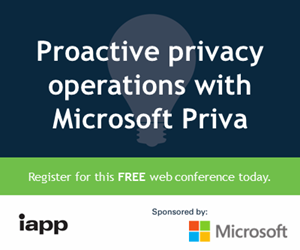Ask 100 people to define privacy and you’ll get 100 definitions. Maybe more?
As has been written several times on this blog before, privacy is personal; it’s cultural and means different things to different people and societies.
And that’s one big reason why drafting privacy into law can be an incredibly difficult and mercurial endeavor. Europe has been working to update its privacy law for three years now and just last year, the European Parliament included and passed nearly 3,000 amendments to the proposed General Data Protection Regulation! (Plus, just today, German Green MEP Jan Philipp Albrecht warned that the proposed regulation could be delayed another year.) And here in the U.S., it seems unlikely that ANYTHING, let alone federal privacy legislation, will get passed anytime soon.
Some laws are nimble and keep up with changing technology—thinking Section 5 of the U.S. Federal Trade Commission Act is a good example—while others seem really outdated and narrow: take the Video Privacy Protection Act (VPPA) as another. Courts and civil litigants have been arguing for years now whether the VPPA, written to protect the privacy of people’s video rental histories, applies to modern streaming services such as Hulu or Netflix.
But California Assemblyman Mike Gatto’s got a different idea.
Why not crowd-source a privacy law? Don’t believe me? Well check it out. In the wiki-style of communal information-generation, criticism and editing, Gatto has created a wiki page complete with editing and word-processing tools to help people take part in drafting new legislation.
“The marketplace of ideas will decide the final draft,” he writes.
Now, this isn’t the first time Gatto has attempted this foray into open-sourced lawmaking, but this latest and more narrow project, he says, is inspired by his new role as the chairman of the Assembly Committee on Privacy and Consumer Protection, a new standing committee in the California legislature.
California Office of the Attorney General Director of Privacy Education and Policy Joanne McNabb, CIPP/US, CIPP/G, CIPT, told me that this is “the first privacy standing committee“ in the state legislature, “the kind that votes on bills.” She added, “Past privacy committees have been select committees, which just hold occasional informational hearings.”
As a result, McNabb suspects this committee will have some clout.
Subsequently, Gatto sees technology as having a large role in drafting legislation while protecting privacy. In a press release, Gatto wrote, “There are growing fears in our society about the ability for technology to intrude into our personal lives and violate individual liberties. This is a great way to use technology to ensure those concerns are heard and give people a direct voice in their government.”
So will this wiki-project work? Or will Jefferson and Adams roll over in their graves? For Gatto, crowd-sourcing this legislation “will allow for a fully transparent brainstorming, drafting and editing process that incorporates ideas, experiences and concerns from a large group of people.”
How large of a group? Well, let’s put it this way: I’m not a California resident and was able to anonymously participate by making a few word changes to the existing wiki-bill (changes in good faith, mind you). Of course, there will be trolls and people with misguided agendas on other topics altogether, but as an idea, you gotta give it to Mr. Gatto for trying something new. Plus, it’s one potential way around interest and lobbying groups drafting legislation behind closed doors (that is, until whatever bill comes out of this is finally submitted to the legislature).
Is this a brave new manifestation of democracy through technology? Or will this simply be an exercise in futility? Will other lawmakers take this bill seriously? And what about the citizens?
I’ll be interested to see the outcome of this project—not only for privacy’s sake but for the future of other lawmaking initiatives as well. We should learn more soon, too, as Mr. Gatto plans a press conference today (Thursday the 8th) on the project. Oh, and the deadline for submitting a consensus to the legislature is early February.
In the meantime, I’ll leave the final word to Mr. Gatto: “Most people aren’t legislators, lawyers or lobbyists … But almost everyone has an opinion on how California’s privacy laws could be improved.”
Top image courtesy of Wikipedia's "democracy" page.































1 Comment
If you want to comment on this post, you need to login.